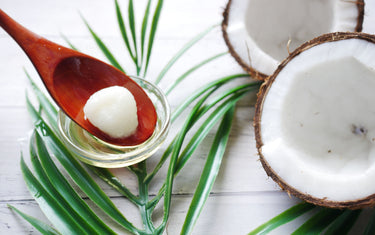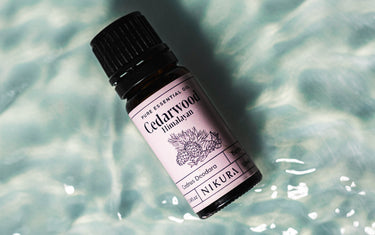4 min read / 19 December 2022 / Laura Garvin Gomez
Is Coconut Oil Good for Psoriasis?
We explore the scientific evidence behind the use of coconut oil for psoriasis and provide tips on how to use it safely and effectively.
Share this post

According to the World Psoriasis Day consortium, millions of people around the world have psoriasis.
While there is no cure for the condition, there are some treatments that can ease symptoms.
Coconut oil is famed for its remarkable benefits for hair, skin, and even similar conditions like eczema.
As a growing number of people are using it to treat their psoriasis too, we’ve decided to dig a little deeper to see if it could help anyone who is living with the condition.
What is psoriasis?Psoriasis is a chronic skin condition that causes the skin to break out into itchy, scaly patches and usually appears on the elbows, knees and the scalp. There is no official medical cure for psoriasis, and it is a long-term condition that can create a lot of pain and discomfort, making it difficult to sleep and focus on simple tasks. |
Is there any research on coconut oil and psoriasis?
Some research has been carried out about coconut oil and Psoriasis which offers positive signs. A 2018 study found that coconut oil has anti-inflammatory properties that suppress inflammatory markers. This means if coconut oil is applied to parts of the skin that are affected by psoriasis, it could help to reduce inflammation.
Virgin coconut oil also works very well as a moisturiser due to its being high in medium-chain fatty acids. A study of 34 patients with mild-to-moderate xerosis found that coconut oil was just as effective as an emollient, safely making the skin more hydrated and increasing surface lipid levels. While you shouldn’t expect over the counter coconut oil to act as a direct substitute for psoriasis medication, it can help to hydrate the skin so the skin can heal more quickly.
What is the best coconut oil for psoriasis?
Fractionated coconut oil is a good choice when it comes to treating psoriasis. This is because it can moisturise without clogging pores, making it easier to penetrate the skin and hydrate, while it also mixes well with other oils.
It is a great source of medium-chain triglycerides, containing fatty acids that are aid effective moisturising so your skin can repair much faster. There is almost no smell to fractionated coconut, which may be preferable to some who do not want an extra scent to contend with.

Can you use coconut oil for scalp psoriasis?
Scalp psoriasis can be tricky to deal with as the skin is located underneath your hair, giving it more time to build up its resilience. However, regularly applying coconut oil to the scalp can help to ease some of the discomfort.
If you want to apply coconut oil to the scalp, spread it evenly over the affected areas on the scalp using your fingertips to softly massage it into the skin. Cover your head with a towel or shower cap and let the oil rest for at least one hour, the wash it out with a suitable shampoo.
You may be able to loosen up the scales on the skin by combing your damp scalp and hair once you have shampooed. Using a comb, you may be able to remove the scales without using too much force.
Learn more about which essential oils are beneficial for scalp health.
Are there any risks to using coconut oil for psoriasis?
It’s important to note that in some rare cases, people could develop an allergic reaction to coconut oil. A study looking at how coconut oil can ease psoriasis skin condition found that not one patient had a full allergic reaction. A small number did experience irritant dermatitis which is milder to a true allergic reaction, suggesting that the risk of reacting to coconut oil was very low.
In most cases, coconut oil is completely safe to use and does not cause an adverse reaction on the skin. However, if this does happen, you should wipe it off your skin immediately and seek medical advice. Before trying any new product, it is also a good idea to discuss things with your doctor who will have a better idea of the severity of your condition.
Natural Remedies for Psoriasis
While coconut oil and psoriasis work together like two peas in a pod, there are some other options worth considering alongside its use.
Light Treatment
Some psoriasis sufferers opt for professional light therapy to help keep their flare-ups under control.
Ask your dermatologist to refer you to a specialist, or seek out salons that offer the service at a good-quality rate. Be sure to check their credentials before booking.
Olive Oil
Olive oil is a good alternative for those that may be allergic to coconut, offering up many of the same benefits.
Apple cider vinegar and aloe vera are also good options, though be sure to dilute the former and avoid leaving it on the skin for too long.
Salts
Adding Epsom salts and dead sea salts to your bathwater can create a salt water soak, which may be extremely beneficial for unpleasant symptoms like itching, soreness and inflammation.

While there is no complete cure for psoriasis, it is about using the available information to find the right solution that best suits your needs.
Using coconut oil for psoriasis does work for a lot of people, helping to ease the discomfort it can cause and giving them a better quality of life.
If you are unsure if it is suitable, consult with a doctor and if given the go ahead, try a test patch on a small part of the skin to make sure there are no adverse reactions.








